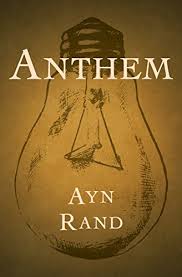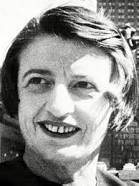Anthem Page #9
Anthem is a dystopian fiction novella by Russian-American writer Ayn Rand, written in 1937 and first published in 1938 in the United Kingdom. The story takes place at an unspecified future date when mankind has entered another Dark Age.
It is a great Council, to which the wisest of all lands are elected, and it meets once a year in the different Cities of the earth. We shall go to this Council and we shall lay before them, as our gift, this glass box with the power of the sky. We shall confess everything to them. They will see, understand and forgive. For our gift is greater than our transgression. They will explain it to the Council of Vocations, and we shall be assigned to the Home of the Scholars. This has never been done before, but neither has a gift such as ours ever been offered to men. We must wait. We must guard our tunnel as we had never guarded it before. For should any men save the Scholars learn of our secret, they would not understand it, nor would they believe us. They would see nothing, save our crime of working alone, and they would destroy us and our light. We care not about our body, but our light is... Yes, we do care. For the first time do we care about our body. For this wire is as a part of our body, as a vein torn from us, glowing with our blood. Are we proud of this thread of metal, or of our hands which made it, or is there a line to divide these two? We stretch out our arms. For the first time do we know how strong our arms are. And a strange thought comes to us: we wonder, for the first time in our life, what we look like. Men never see their own faces and never ask their brothers about it, for it is evil to have concern for their own faces or bodies. But tonight, for a reason we cannot fathom, we wish it were possible to us to know the likeness of our own person. PART SIX We have not written for thirty days. For thirty days we have not been here, in our tunnel. We had been caught. It happened on that night when we wrote last. We forgot, that night, to watch the sand in the glass which tells us when three hours have passed and it is time to return to the City Theatre. When we remembered it, the sand had run out. We hastened to the Theatre. But the big tent stood grey and silent against the sky. The streets of the City lay before us, dark and empty. If we went back to hide in our tunnel, we would be found and our light found with us. So we walked to the Home of the Street Sweepers. When the Council of the Home questioned us, we looked upon the faces of the Council, but there was no curiosity in those faces, and no anger, and no mercy. So when the oldest of them asked us: “Where have you been?” we thought of our glass box and of our light, and we forgot all else. And we answered: “We will not tell you.” The oldest did not question us further. They turned to the two youngest, and said, and their voice was bored: “Take our brother Equality 7-2521 to the Palace of Corrective Detention. Lash them until they tell.” So we were taken to the Stone Room under the Palace of Corrective Detention. This room has no windows and it is empty save for an iron post. Two men stood by the post, naked but for leather aprons and leather hoods over their faces. Those who had brought us departed, leaving us to the two Judges who stood in a corner of the room. The Judges were small, thin men, grey and bent. They gave the signal to the two strong hooded ones. They tore the clothes from our body, they threw us down upon our knees and they tied our hands to the iron post. The first blow of the lash felt as if our spine had been cut in two. The second blow stopped the first, and for a second we felt nothing, then the pain struck us in our throat and fire ran in our lungs without air. But we did not cry out. The lash whistled like a singing wind. We tried to count the blows, but we lost count. We knew that the blows were falling upon our back. Only we felt nothing upon our back any longer. A flaming grill kept dancing before our eyes, and we thought of nothing save that grill, a grill, a grill of red squares, and then we knew that we were looking at the squares of the iron grill in the door, and there were also the squares of stone on the walls, and the squares which the lash was cutting upon our back, crossing and re-crossing itself in our flesh. Then we saw a fist before us. It knocked our chin up, and we saw the red froth of our mouth on the withered fingers, and the Judge asked: “Where have you been?” But we jerked our head away, hid our face upon our tied hands, and bit our lips. The lash whistled again. We wondered who was sprinkling burning coal dust upon the floor, for we saw drops of red twinkling on the stones around us. Then we knew nothing, save two voices snarling steadily, one after the other, even though we knew they were speaking many minutes apart: “Where have you been where have you been where have you been where have you been?...” And our lips moved, but the sound trickled back into our throat, and the sound was only: “The light... The light... The light....” Then we knew nothing. We opened our eyes, lying on our stomach on the brick floor of a cell. We looked upon two hands lying far before us on the bricks, and we moved them, and we knew that they were our hands. But we could not move our body. Then we smiled, for we thought of the light and that we had not betrayed it. We lay in our cell for many days. The door opened twice each day, once for the men who brought us bread and water, and once for the Judges. Many Judges came to our cell, first the humblest and then the most honored Judges of the City. They stood before us in their white togas, and they asked: “Are you ready to speak?” But we shook our head, lying before them on the floor. And they departed. We counted each day and each night as it passed. Then, tonight, we knew that we must escape. For tomorrow the World Council of Scholars is to meet in our City. It was easy to escape from the Palace of Corrective Detention. The locks are old on the doors and there are no guards about. There is no reason to have guards, for men have never defied the Councils so far as to escape from whatever place they were ordered to be. Our body is healthy and strength returns to it speedily. We lunged against the door and it gave way. We stole through the dark passages, and through the dark streets, and down into our tunnel. We lit the candle and we saw that our place had not been found
Translation
Translate and read this book in other languages:
Select another language:
- - Select -
- 简体中文 (Chinese - Simplified)
- 繁體中文 (Chinese - Traditional)
- Español (Spanish)
- Esperanto (Esperanto)
- 日本語 (Japanese)
- Português (Portuguese)
- Deutsch (German)
- العربية (Arabic)
- Français (French)
- Русский (Russian)
- ಕನ್ನಡ (Kannada)
- 한국어 (Korean)
- עברית (Hebrew)
- Gaeilge (Irish)
- Українська (Ukrainian)
- اردو (Urdu)
- Magyar (Hungarian)
- मानक हिन्दी (Hindi)
- Indonesia (Indonesian)
- Italiano (Italian)
- தமிழ் (Tamil)
- Türkçe (Turkish)
- తెలుగు (Telugu)
- ภาษาไทย (Thai)
- Tiếng Việt (Vietnamese)
- Čeština (Czech)
- Polski (Polish)
- Bahasa Indonesia (Indonesian)
- Românește (Romanian)
- Nederlands (Dutch)
- Ελληνικά (Greek)
- Latinum (Latin)
- Svenska (Swedish)
- Dansk (Danish)
- Suomi (Finnish)
- فارسی (Persian)
- ייִדיש (Yiddish)
- հայերեն (Armenian)
- Norsk (Norwegian)
- English (English)
Citation
Use the citation below to add this book to your bibliography:
Style:MLAChicagoAPA
"Anthem Books." Literature.com. STANDS4 LLC, 2025. Web. 10 Mar. 2025. <https://www.literature.com/book/anthem_329>.








Discuss this Anthem book with the community:
Report Comment
We're doing our best to make sure our content is useful, accurate and safe.
If by any chance you spot an inappropriate comment while navigating through our website please use this form to let us know, and we'll take care of it shortly.
Attachment
You need to be logged in to favorite.
Log In